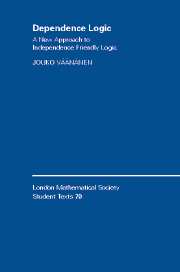3 - Dependence logic
Published online by Cambridge University Press: 15 December 2009
Summary
Dependence logic introduces the concept of dependence into first order logic by adding a newkind of atomic formula. We call these new atomic formulas atomic dependence formulas. The definition of the semantics for dependence logic is reminiscent of the definition of the semantics for first order logic, presented in Chapter 2. But instead of defining satisfaction for assignments, we follow ref. [21] and jump one level up considering sets of assignments. This leads us to formulate the semantics of dependence logic in terms of the concept of the type of a set of assignments.
The reason for the transition to a higher level is, roughly speaking, that one cannot manifest dependence, or independencefor that matter, in a single assignment. To see a pattern of dependence, one needs a whole set of assignments.
This is because dependence notions can be best investigated in a context involving repeated actions by agents presumably governed by some possibly hidden rules. In such a context dependence is manifested by recurrence, and independence by lack of it.
Our framework consists of three components:
teams, agents, and features.
Teams are sets of agents. Agents are objects with features. Features are like variables which can have any value in a given fixed set.
If we have n features and m possible values foreach feature, we have altogethermn different agents. Teams are simply subsets of this space of all possible agents.
Although our treatment of dependence logic is entirely mathematical, our intuition of dependence phenomena comes from reallife examples, thinking of different ways dependence manifests itself in the real world.
- Type
- Chapter
- Information
- Dependence LogicA New Approach to Independence Friendly Logic, pp. 10 - 47Publisher: Cambridge University PressPrint publication year: 2007
- 1
- Cited by



